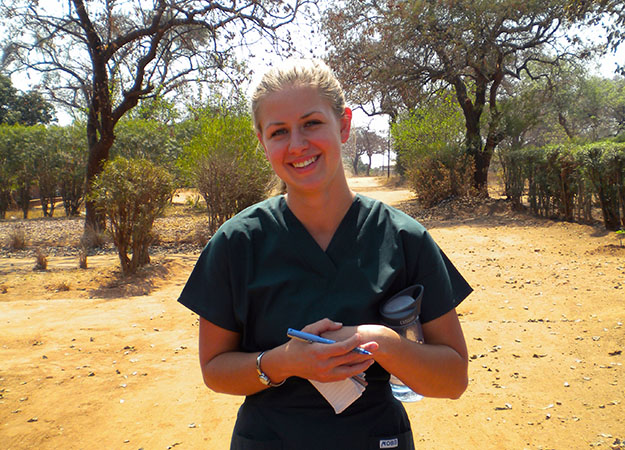Hands across the water: A clinical placement in Zambia

Nursing student Hannah Bell spent more than two months at Bell Macha Mission Hospital in Zambia, practicing in a number of fields. She joined 19 other students in global health professional practice placements all over the world.
Having recently returned from a clinical placement in Zambia, McMaster nursing student Hannah Bell is reflecting on an experience that piqued her interest in future international work.
“This was really just a way to get a taste of if it’s something I want to do long term, and, it definitely is,” says Bell.
The School of Nursing’s Global Health Professional Practice Placements offer senior-year students an opportunity to learn about global health, comparative healthcare systems and the role of the nurse in cross-cultural and resource-constrained environments.
Bell was one of 20 students who spent 10 to 12 weeks in 2012 developing their nursing skills in a different corner of the globe – places like India, Kenya, Nepal, Thailand and Nicaragua.
Since 1984, more than 240 McMaster students have participated in domestic and international outpost placements, spanning 25 countries worldwide and in six provinces and three territories in Canada.
Bell completed her placement last fall at the Macha Mission Hospital in Zambia – a landlocked country in southern Africa. She practiced pediatrics, worked in maternity and operating rooms and also helped at an HIV clinic. In Zambia, explains Bell, family is much more involved in caring for the patients.
“Nurses handle the medical side, but the humanistic, caring aspect is left up to the families. It’s not like here in Canada, where nurses are expected to be compassionate and caring,” she says.
Another challenge was a shortage of nurses combined with a high volume of patients. Bell says it was common to have two nurses with 20 children waiting for care. However, this helped her develop better time-management skills and learn how to handle a heavier workload.
“I strengthened a lot of my skills. I was the one there who had to do it all, from inserting feeding tubes for malnourished children to providing medications,” says Bell. “It heightens your creativity as a nurse.”
Michael Ladouceur and Iris Mujica are assistant professors of Nursing and co-chairs of the School’s Global Health Education Committee. Through the experience, Ladouceur feels the students become true citizens of the world, not just Canada.
Mujica elaborates: “The uniqueness of our program is that our students maintain constant communication with their clinical tutor back in Canada.” The tutor is a McMaster faculty member with whom the student connects each week to discuss challenges and highlights, and ask questions.
Mujica, a McMaster alumna, recalls doing her own placement in Temuco, Chile in 1998 and having to use phone, fax, telegraph and paper mail to stay connected with her tutor because email was so slow.
“But to me it was very important to have that connection with my clinical tutor,” she says. “The support of the faculty member is so important. We constantly hear that from the students.”
Click here to learn more about the program.
